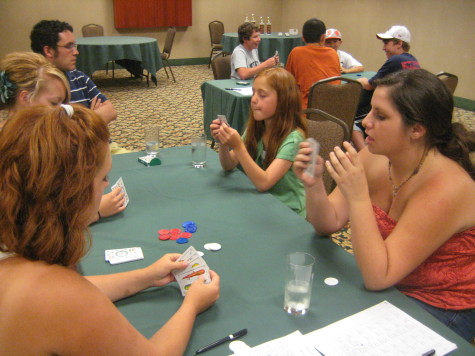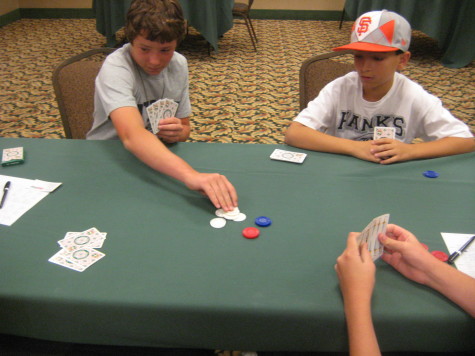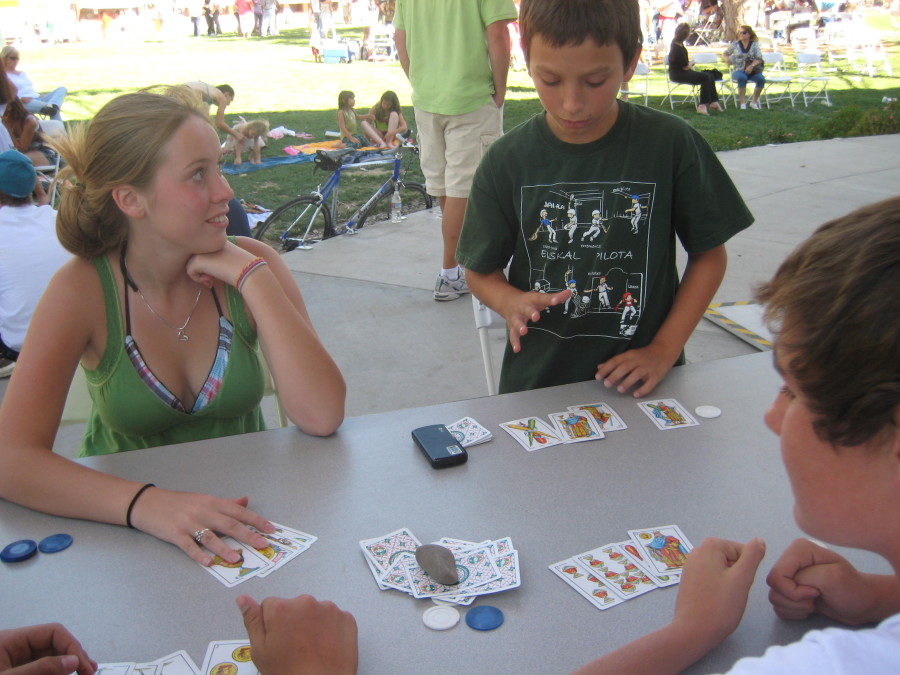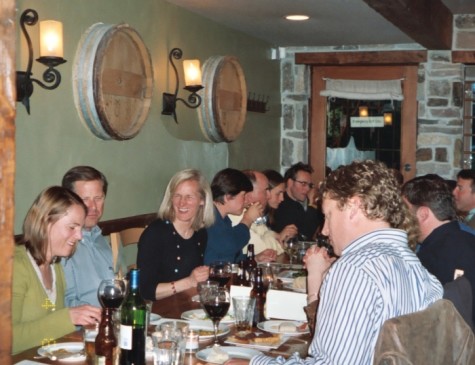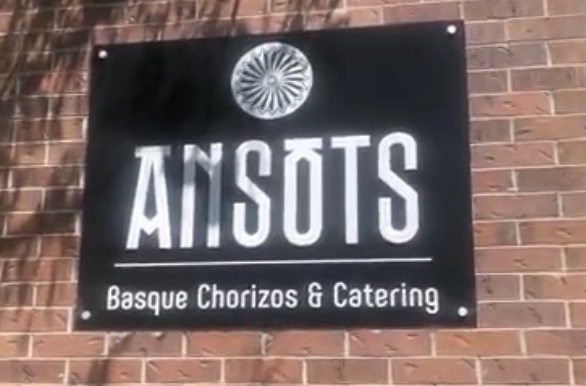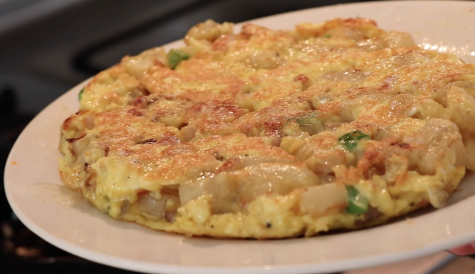How to Play the Basques’ Favorite Card Game Mus
Learn How to Play Mus
March 30, 2020
Mus is a card game that originated in the Basque Country. It involves smarts and bluffing and is very popular in the U.S. Basque community. Instructions for how to play mus are located below.
The history of mus in the U.S. Basque community
Almost every Basque club sponsors an annual mus tournament, which is sometimes the most popular event of the year. Some people enjoy the card game so much that they will join several clubs in order to play in multiple mus tournaments.
The winners of the different club tournaments play against each other in an annual tournament sponsored by the North American Basque Organizations (NABO). It rotates to different U.S. Basque communities every year.
The winner of the NABO mus tournament goes on to play in an international tournament that takes place in a different country every year. The countries that host tournaments besides the U.S. are France and Spain and several countries in South America.
RELATED EUSKAL KAZETA POSTS
Jaialdi 2010 has Junior Mus too
Best Books to Learn About the Basques
The NABO tournament started in 1977, and the international tournament started in 1979. The tournaments have increased interest in the game, which continues to grow in popularity. Some clubs joined NABO simply so the winners of their tournament could participate in the national tournament. New tournaments are added every year. Contact your local Basque club to find out when their tournament is scheduled. Most take place in the spring, to qualify for the summer NABO tournament. Click this link to the NABO Calendar to see if there are any tournaments near you.
Some clubs sponsor mus lessons. Contact your local Basque club for information. (There are several in California, Nevada and Idaho. New York City, Denver, Colo., and New England also currently have clubs).
Watch this 30-minute video by Joe Goyhenetche for great instructions.
NABO sponsors an annual two-week Basque summer camp, Udaleku, for kids ages 10 to 15 to help promote the Basque culture. The students learn folk dances, sports and other cultural traditions. Mus, taught by the all-knowing Monique Heguilestoy Flesher, is one of the campers’ favorite activities.
NABO also sponsors an annual youth tournament, known as Junior Mus, to encourage clubs to promote the playing of mus by young people.
HOW TO PLAY MUS
Needed:
* A deck of cards from which the 8’s, 9’s and 10’s have been removed. Click this Amazon link to purchase the traditional Spanish card deck of 40 cards.
* Poker chips (at least 6 reds and 6 blues – worth 5 points each) and 8 whites (worth 1 point each) Buy an inexpensive set of poker chips from Amazon or make your own out of colored paper or use different kinds of beans.
Ideally, two teams of two people play against each other, and the goal is for a team to win bets on individual hands in order to be the first team to reach a certain number of points (usually 40). Team members cannot show their cards to each other, so they sometimes devise facial expressions to reveal their hand to their partner.
The basic vocabulary of more than 30 words in Basque that are used to play and bet a hand are mostly listed here. Most players can easily learn the vocabulary, even if they don’t speak Basque. Some words change slightly, based on the dialect of the people playing.
First you shuffle the cards and have the person to the left of the dealer cut the deck. Distribute the cards counter-clockwise, one at a time, 4 per person. The person to the right of the dealer, known as esku, starts the betting and it moves counter-clockwise.
Mus:
First you must decide if everyone wants to replace their cards. Good strategy means trying to collect cards that will strengthen betting, however it’s difficult to have cards that are good for more than one round of betting. Everyone announces mus (exchange cards) or mintza (let’s play), and the dealer replaces whatever number of cards they turn in. They can go mus as many times as they want, but once someone announces mintza, then card exchange is over and the game must start. So you should always be ready to play with what you’ve got.
Betting:
For the first two rounds, if you want to bet, you say enbido. If you don’t want to bet, say paso.
If the other team accepts the bet, one of them says idoki. If they reject the bet, one of the team members says tira. With tira, the team forfeits a point and the other team immediately gets a white poker chip. The first bet by a player is the bet for the team. Cards are not revealed until the end, when all betting is done.
Players can also raise the bet berriz (double).
The default betting amount is two points, but the player can bet a larger amount. Hordago is the term you use to bet the entire game.
Bluffing:
You can bet any way you want regardless of what cards you have. It usually works to your advantage to make the other team believe you hold good cards, but the opposite might also be true.
The bets always go in the same order:
Haundiak (Biggest)
For the first bet, you will win with the highest face cards (Kings (12), then queens (11), etc.).
Ttipiak (Smallest)
For this bet, the lowest cards win. (Aces (1), 2s, etc.)
Pareak (Pairs):
For pareak or jokua, the players indicate if they have these combinations with bai (yes) or ez (no). Higher pareak beat lower pareak. Mediak (a trio) beats a pair, and dobleak (two pair) beats mediak.
Jokua (Game):
Jokua is a combination of cards that add up to any number between 31 to 40. Face cards are 10 points for jokua. The order for winning hands in jokoa is a total of 31 points (best combination), 32, 40, 37, 36, 35, 34, 33. If no one has jokua, you play for the highest points – puntuak.
Scoring:
After all the bets are have been made, you count up the points for each team and distribute the chips. Some good players can keep track of the bets in their heads. Beginners may have to write down how each round went in order to add up points at the end. Write down the results of each game. First team to earn 40 points wins.
If players passed on the bet (tira), then that bet is ignored. For most bets, the winner gets 2 points. Jokua is 3 points, other jokua are worth 2 points. The high score in puntuak is worth 1 point.
Watch the video above to reinforce the info here.
NABO easy-to-read chart on how to play
Global mus, the group that sponsors the international tournament
Wikipedia attributes the original of the game of mus to the Basques because it was first mentioned in a Basque-Spanish-Latin dictionary in 1745.
Originally published January 30, 2016
